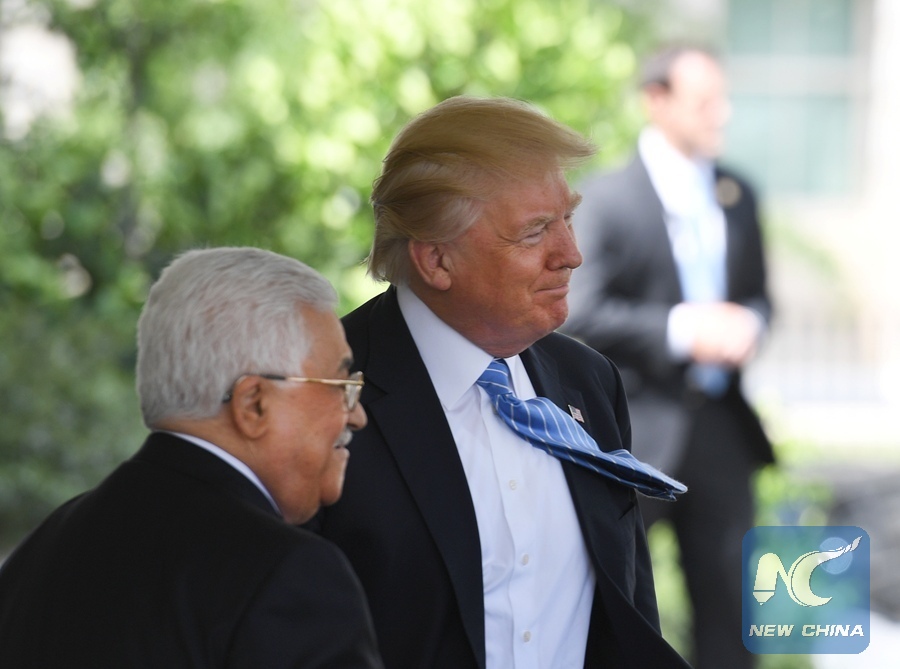
U.S. President Donald Trump (R) welcomes visiting Palestinian President Mahmoud Abbas at the White House in Washington D.C., the United States, May 3, 2017.(Xinhua/Yin Bogu)
by Matthew Rusling
WASHINGTON, May 4 (Xinhua) -- Washington may be able to broker small steps toward Israeli-Palestinian peace, but long-lasting peace is not in the cards for the time being, U.S. experts said.
U.S. President Donald Trump vowed on Wednesday to "do whatever is necessary to negotiate a peace deal between Israel and the Palestinians," as he met with Palestinian President Mahmoud Abbas for their first meeting at the White House.
But Trump offered no specifics on how he could revive peace talks which have been stalled since April 2014.
Experts said a full peace plan is highly unlikely any time soon, but that the two sides can take baby steps toward peace, with the Trump administration as an intermediary.
"I don't think there's much chance at all that they could broker a final settlement or a whole peace agreement between Israel and the Palestinians," David Pollock, a senior fellow at the Washington Institute for Near East Policy, told Xinhua.
"People, I would say, are not thinking about that as an immediate goal, but rather as an ultimate goal. And in the meantime the idea is to come up some much smaller steps in that direction," Pollock said.
Those steps might include confidence building measures, practical improvements, willingness to widen the circle or deepen the circle of dialogue to include other Arab countries, he said.
"I think people are pretty realistic," Pollock said. "And they are looking for movement, for progress, which would be a positive change, an improvement over a stalemate that's gone on for almost ten years now."
On that score, there actually is a reasonable chance that the parties will be able to come up with something.
"And they've already convinced Israeli Prime Minister Benjamin Netanyahu to, for example, just informally, quietly to limit Israeli settlement building outside the wall," Pollock noted.
So the next step for the Trump administration is to get a reciprocal step by the Palestinians, he said.
"That's not going to be easy but I think that's what to look for. Look for something that the Palestinians offer, whether it's on recognizing that Israel is a homeland for the Jewish people, or that Jews have historical links to the land or something like that," Pollock said.
Some have called for the Palestinians to stop their practice of paying money to the families of Palestinians killed in attacking Israelis as Netanyahu has requested.
Trump has assigned his Jewish son-in-law, Jared Kushner, to work on the issue.
Darrell West, vice president and director of governance studies at the Brookings Institution, told Xinhua that while it's true Kushner has almost no real Mideast qualifications, he speaks for Trump and is a close ally, and that might carry some weight.
"Kushner has little experience in Mideast politics and has not dealt with all the complications involved in negotiating there. However, his one big credential is the family connection to President Trump," West said.
"It is hard to see that Kushner will be successful in Mideast politics because the leaders he is dealing with are intransigent and not committed to bringing peace to the region. That will make it nearly impossible to reach a successful resolution," West added.

